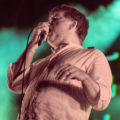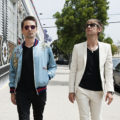The Lickerish Quartet pack the power pop sting of cult favorites Jellyfish after 26 years apart
 Photo provided by Jay Gilbert
Photo provided by Jay Gilbert
When the mounds of hair metal were being replaced by the rawness of grunge throughout the early 1990s, Jellyfish drove down the entirely different lane of harmony-stacked power pop with sprinklings of psychedelia.
Mainstream attention turned out to be elusive, but that didn’t stop the guys from attracting a cult following and fellow musician fans as grand as The Beatles’ Ringo Starr, The Beach Boys’ Brian Wilson and Queen’s Brian May, while also laying the earliest foundations for Ben Folds Five and countless underground artists.
Even so, the band quietly broke up after a 1994 tour supporting the masterful “Spilt Milk” (which visited the Metro, Rose Records and the Star Plaza Theatre) with members since spreading their wings towards several offshoot acts and sessions.
Though it’s not quite the complete Jellyfish line-up, a new group known as The Lickerish Quartet is nonetheless an excellent evolutionary chapter in its annals, reuniting vocalist/keyboardist Roger Joseph Manning Jr. (Beck, Air, Cheap Trick, Imperial Drag), vocalist/bassist/guitarist Tim Smith (Noel Gallagher’s High Flying Birds, Sheryl Crow, The Finn Brothers) and vocalist/guitarist Eric Dover (Slash’s Snakepit, Alice Cooper, Imperial Drag).
Chicago Concert Reviews tracked down the latter for a preview of their “Threesome Vol. 1” EP (out May 15), stepping back in the Jellyfish family’s shoes and what life’s been like on the alternative side of the dial.
 What were the circumstances that birthed The Lickerish Quartet?
What were the circumstances that birthed The Lickerish Quartet?
Eric Dover: The Lickerish Quartet essentially started in 2017 when Roger Manning Jr. got in touch with Tim Smith about collaborating on some new music. I was brought in shortly thereafter. Before we knew it, we were off and running.
The three of you haven’t technically all played together since Jellyfish broke up in 1994. How long did it take to get back on the same page or was it like riding a bike?
Dover: In short, yes, it was like riding a bike. We are all quite familiar with the songwriting process, either together or separately, so it wasn’t difficult to pick back up together.
What types of styles did you set out to include on “Threesome Vol. 1” and did any additional ideas come up along the way?
Dover: We mainly focused on writing the songs and arrangements first, then when it came to stylizing things, we just went for sounds that we all collectively knew we liked hearing together. There are always ideas floating about and we tried as many as time would allow.
Why did you decide to release a series of EPs rather than a full-length album?
Dover: We are basically dipping our toes in the musical ocean together for the first time in quite a few years, so it made sense for us to go slow with it. We decided that releasing three EPs, rather than a full-length album, would give listeners more time to spend with each song, instead of 12 songs hitting you all at once.
How did your work with so many other artists inform your work with this group?
Dover: Obviously anytime you work with different artists, you are bound to learn something. Between the three of us, we have worked with several amazing, groundbreaking artists and have learned a lot about the way they chose to communicate, always striving to serve the music first. I believe that if anything, that’s the common denominator between our work with other artists separately and The Lickerish Quartet. The most important rule is to make the music as good as you can. Worry about the image later.
Would it be fair to call this the next evolutionary chapter of Jellyfish and Imperial Drag?
Dover: There are some similarities sure, but I don’t think we consciously are trying to re-live our past in that regard. There’s no grand plan like that. We’re simply rekindling our musical friendship together in the most honest way we know how to do it.
At this point, you’re all very well-respected within the power pop ranks, but didn’t seem to get as much mainstream attention as you deserved. Did that ever bother you or are you content being appreciated with those in the know?

Jellyfish
Out of the many artists that have cited your previous work as an influence, who are some of your favorites and why?
Dover: Good question. I know we have fans that are great artists in their own right. I’m always blown away that the albums we’ve been involved with have resonated so well with other musicians and I’m very grateful for that. Offhand I don’t have a favorite, but I do have a deep appreciation for their support. It’s always nice to have some validation for what you do.
What additional perspective did you gain from the Jellyfish remasters that Omnivore Recordings put out a few years back?
Dover: It brings back a wash of memories, mostly all good in retrospect. Even the live performances have aged quite well. I’m happy for that. I don’t even think I was shaving yet. Salad days indeed.
What do you recall most about being in the thick of the early ‘90s transition between hair metal and grunge, yet being completely in your own lane?
Dover: It was an interesting time, but sometimes one could feel like a visitor from another planet. Now I’m used to that feeling and it suits me fine!
Once it’s possible, are there touring plans for The Lickerish Quartet and what might those set lists look like?
Dover: We don’t have immediate plans for anything like a full blown tour. Perhaps we may do a few select engagements, either online or in a limited live setting. It’s still a book being written as we go in a sense. If the possibility exists, we will explore it. As for what we’d play, I’ll have to leave that a mystery for now.
Can you recall any standout shows in Chicago across any of your projects?
Dover: I love Chicago and have never had a bad time there. It seems that every show I’ve been involved with has always went down a storm. Made some good friends along the way too. Thanks to all our friends and fans in your fair city! Hopefully we can come visit for a spell with you in the future!
For additional information on The Lickerish Quartet, visit TheLickerishQuartet.com.








